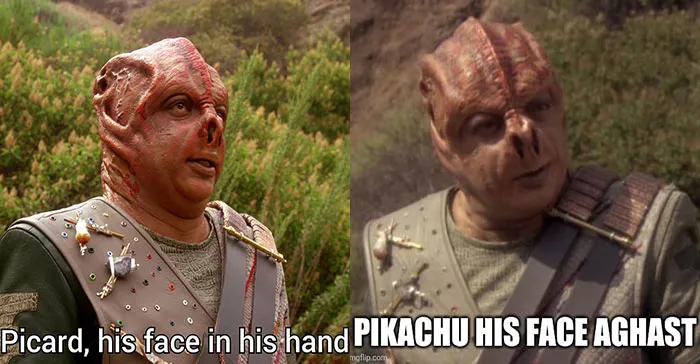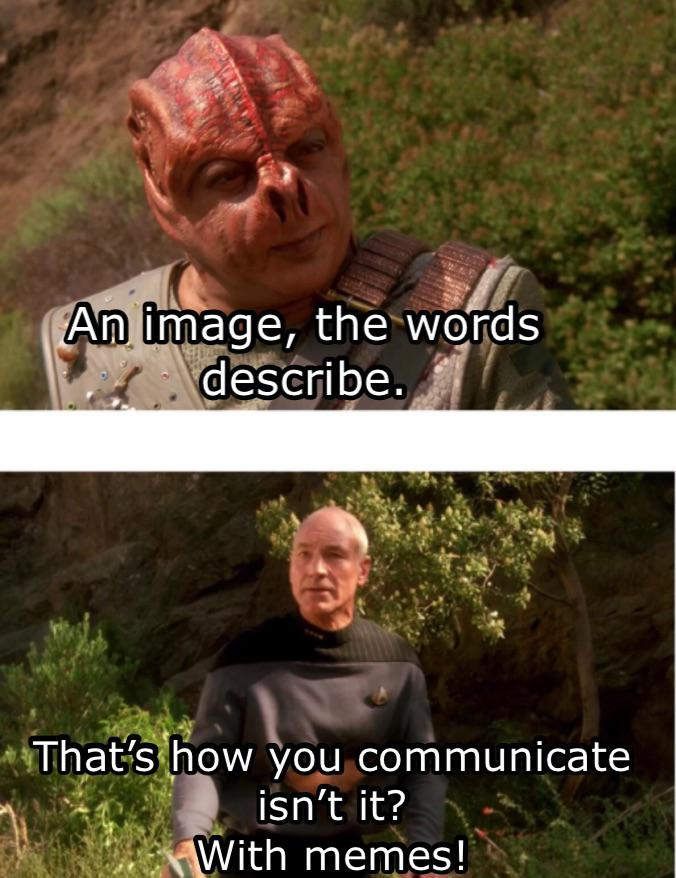It is relatively easy to recognize that they are speaking in metaphors. It is rather harder to understand just what a particular metaphor means if it refers to people, places, and things outside your own culture.
Do you know what "runs like a red moped" means?
Maybe you understand "like under Hampels' bed" without it being explained to you.
Both expressions are used in German (in the area I live in,) but I doubt you will be able to make sense of them - unless you have seen an example of both expressions in use.
In the Star Trek episode, the Tamarians use references to people and places from their own culture and planets - as well as other cultures and planets.
You have to first locate the origin of the references, then find the significance of the referenced people, places, and things in relation to the current situation.
It took Data sorting through databases of many cultures to find the references - and still, you have to interpret the references once you've found them.
Even just finding the reference is a colossal task. How do you find a place when you've only heard its name pronounced? How do you know you have a place's or person's correct name? What if the name you have is one of many possibilities, but not everyone knows all of the variations?
Take the capital of Cyprus, the city of Nicosia. It is known as Nikosia, Nicosia, Lefkosia, Λευκωσία, Նիկոսիա, Lefkoşa, and Nikusiya. What if the metaphor refers to the Arabic form (Nikusiya) but your reference materials only cover the Turkish form Lefkoşa? Say you are trying to end a war, and you keep getting told "Λευκωσία." Your references don't have that spelling, so you keep missing the reference to the divided city of Nicosia as a way to make a peaceful end to the war.
Recognizing that the Tamarians are using metaphors isn't that hard. Interpreting the metaphors in relation to the current situation to get the point of the communication is the difficult thing.
Picard figures out the metaphors because Dathon has put himself and Picard in the situations described in the metaphors.
Data makes some (limited) sense of the metaphors by doing extensive searches of the culture and literature of all known planets around and close to the Tamarians home planet.
Added:
Why didn't the universal translator translate the gist of the thing?
My examples are simple metaphors.
In the TV episode, the metaphors are references to entire epics. "Darmok and Jalad at Tanagra" isn't a simple, single thing. It is an entire epic story. The universal translator can't convey all that belongs to that entire epic in just a few words. The translator is trying to keep up with spoken words - it would have to be able to read the entire story from the speaker's mind, filter out the relevant bit, and translate just that releavant bit fast enough to keep up with the spoken word. Try telling the story of "Darmok and Jalad at Tanagra" (or even just the relevant bits) in just the space of time it takes to say five words.
Look at it this way:
If you and I are talking about someone, and I say "Deliverance" then you may well know that I mean the banjo playing kid because our mutual acquaintance also plays the banjo (and also otherwise resembles the banjo playing kid from the "dueling banjos" scene.) If I just walk into a room full of people and say "Deliverance," then nobody is going to know what part of it I mean - or even what I'm talking about, since "deliverance" is not just the name of the movie, it is also a (somewhat) commonly used word on its own.
That's the position the universal translator is in. It translates what it can, but can't make sense of the baggage behind the spoken words.
"Runs like a red moped."
German: "Geht ab wie ein rotes Moped." Simplest form: something (vehicle) that is very fast. Also used to refer to a person doing something loudly and enthusiastically, though not necessarily well. "Fritz ging ab wie ein rotes Moped auf dem Rammstein Konzert gestern Abend." Fritz went wild at the konzert - probably dancing or singing (screaming) along with the songs. "Moped" in German is the same as "moped" in English, except that full size (powerful and fast) motorcycles are deprecatingly referred to as mopeds by their riders. "Red moped" because red painted anything is faster than other colors.
"Like under Hampels' bed."
German: "Wie bei Hampels unterm Bett." "Hampels" are your low life neighbors, the ones who never clean house. The ones with filthy floors and stuff piled on the furniture. If something is in the way, they just kick it under the bed - dirt and all. There's a horrible mess of filthy stuff just tossed under the bed any old way. If something looks "like under Hampels' bed," then it's a collosal, dirty mess.


